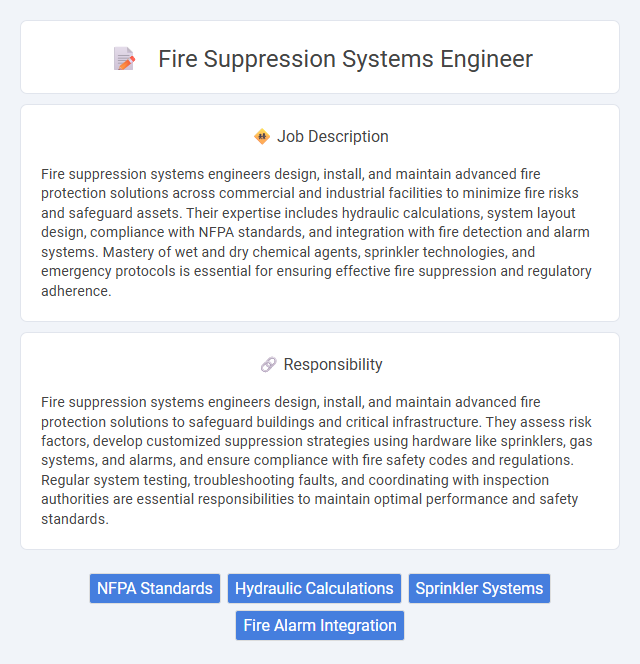
Fire suppression systems engineers design, install, and maintain advanced fire protection solutions across commercial and industrial facilities to minimize fire risks and safeguard assets. Their expertise includes hydraulic calculations, system layout design, compliance with NFPA standards, and integration with fire detection and alarm systems. Mastery of wet and dry chemical agents, sprinkler technologies, and emergency protocols is essential for ensuring effective fire suppression and regulatory adherence.
Individuals who demonstrate strong problem-solving skills, attention to detail, and a solid understanding of fire safety codes are likely to excel as fire suppression systems engineers. Those comfortable working with technical equipment, analyzing risks, and responding to emergency situations may find this job well-suited to their abilities. Candidates who prefer routine tasks or limited physical activity might struggle in this role, given its dynamic and safety-critical nature.
Qualification
A Fire Suppression Systems Engineer must hold a degree in mechanical or fire protection engineering, coupled with certifications such as NICET Level II or higher in fire protection systems. Proficiency in designing, installing, and maintaining fire suppression systems compliant with NFPA standards is essential. Experience with hydraulic calculations, system testing, and familiarity with relevant codes and regulations enhances job qualifications.
Responsibility
Fire suppression systems engineers design, install, and maintain advanced fire protection solutions to safeguard buildings and critical infrastructure. They assess risk factors, develop customized suppression strategies using hardware like sprinklers, gas systems, and alarms, and ensure compliance with fire safety codes and regulations. Regular system testing, troubleshooting faults, and coordinating with inspection authorities are essential responsibilities to maintain optimal performance and safety standards.
Benefit
Fire suppression systems engineers likely experience increased job stability due to growing safety regulations and demand for advanced fire protection solutions. They probably benefit from competitive salaries and opportunities for career advancement as industries prioritize risk management. Their expertise in designing and maintaining critical safety infrastructure could also enhance their professional reputation and job satisfaction.
Challenge
A fire suppression systems engineer likely faces the challenge of designing effective, reliable systems that comply with evolving safety regulations and standards. There is a high probability that problem-solving skills are essential when addressing complex environments and integrating new technologies. Continuous learning and adaptation to emerging fire prevention methods may also be key aspects of this role's challenges.
Career Advancement
Fire suppression systems engineers design, install, and maintain advanced fire protection technologies ensuring safety compliance in commercial and industrial settings. Career advancement often involves gaining certifications such as NICET or NFPA, leading to roles in project management, system design consultancy, or senior engineering positions. Expertise in emerging technologies like smart fire detection and integrated suppression systems significantly enhances job prospects and salary potential.
Key Terms
NFPA Standards
Fire suppression systems engineers design and implement fire protection solutions adhering to NFPA Standards such as NFPA 13 for sprinkler systems and NFPA 72 for fire alarm and signaling. They ensure compliance with NFPA 25 for inspection, testing, and maintenance of water-based protection systems to optimize safety and reliability. Expertise in NFPA 101 Life Safety Code is crucial for integrating suppression systems into building occupancy and egress plans.
Hydraulic Calculations
Fire suppression systems engineers specializing in hydraulic calculations analyze water flow characteristics to ensure effective fire protection coverage. They design piping layouts, determine pressure requirements, and select appropriate pump capacities based on hydraulic modeling. Mastery of NFPA standards and hydraulic principles ensures compliance and optimal system performance under emergency conditions.
Sprinkler Systems
Fire suppression systems engineers specializing in sprinkler systems design, install, and maintain automatic fire sprinklers to protect buildings and assets from fire damage. They ensure compliance with NFPA standards and local fire codes, perform hydraulic calculations, and select appropriate sprinkler heads based on occupancy hazards. Expertise in system layout, pressure sourcing, and integration with fire alarm controls is critical for effective fire protection and safety assurance.
Fire Alarm Integration
Fire suppression systems engineers specializing in fire alarm integration design and implement advanced detection and control solutions to ensure rapid response during fire emergencies. Expertise includes configuring interconnected alarm panels, sensors, and suppression devices to comply with NFPA standards and local fire codes. Proficiency in system programming, troubleshooting, and testing guarantees reliable fire detection and activation of suppression mechanisms for optimal safety.
 kuljobs.com
kuljobs.com